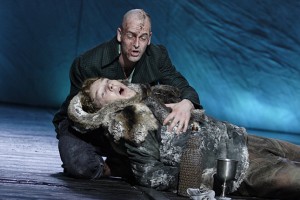“Believe me: It is no teaching and no instruction that I give you. On what basis should I presume to teach you? I give you news of the way in this man, but not of your own way. My path is not your path, therefore I cannot teach you. The way is within us, but not in Gods, nor in teachings, nor in laws. Within us is the way, the truth, and the life.
Woe betide those who live by way of examples! Life is not with them. If you live according to an example, you thus live the life of that example, but who should live your life if not yourself? So live yourselves.
The signposts have fallen, unblazed trails lie before us. Do not be greedy to gobble up the fruits of foreign fields. Do you not know that you yourselves are the fertile acre which bears everything that avails you?
Yet who today knows this? Who knows the way to the eternally fruitful climes of the soul? You seek the way through mere appearances, you study books and give ear to all kinds of opinion. What good is all that?
There is only one way and that is your way.
You seek the path? I warn you away from my own. It can also be the wrong way for you.
May each go his own way.
I will be no saviour, no lawgiver, no master teaching unto you. You are no longer little children.
Giving laws, wanting improvements, making things easier, has all become wrong and evil. May each one seek out his own way. The way leads to mutual love in community. Men will come to see and feel the similarity and commonality of their ways.
Laws and teachings held in common compel people to solitude, so that they may escape the pressure of undesirable contact, but solitude makes people hostile and venomous.
Therefore give people dignity and let each of them stand apart, so that each may find his own fellowship and love it.
Power stands against power, contempt against contempt, love against love. Give humanity dignity, and trust that life will find the better way.” (C.G.Jung, The Red Book: Liber Novus, cca. 1913)
“What we are now going to do, therefore, is to learn about ourselves, not according to me or to some analyst or philosopher – because if we learn about ourselves according to someone else, we learn about them, not ourselves – we are going to learn what we actually are. […]
I do not demand your faith; I am not setting myself up as an authority. I have nothing to teach you – no new philosophy, no new system, no new path to reality; there is no path to reality any more than to truth. All authority of any kind, especially in the field of thought and understanding, is the most destructive, evil thing. Leaders destroy the followers and followers destroy the leaders. You have to be your own teacher and your own disciple.” (excerpt of talks by Jiddu Krishnamurti, cca. 1963-1967)
“You’ve got no one to follow and no one will follow you… ain’t that a relief,
That everything and everyone
Must grow in opposition to resistance
And contradiction
This ain’t no time to go to sleep” (Tina Dico No time to sleep, cca. 2007)


